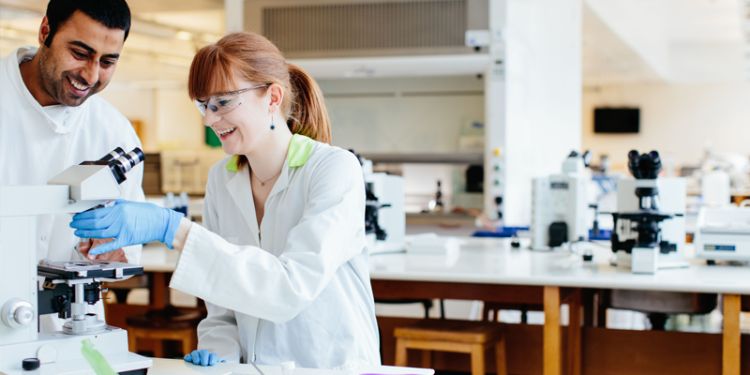Natural Sciences 2023/24
Biochemistry

Biochemistry is about understanding how the vast array of biological systems function at the molecular level. Biochemists understand how the complex interactions of molecules control processes in cells, and manipulate these systems to produce new therapeutic agents and materials. It’s a subject that has an enormous impact on modern life.
Subject combinations available:
- biochemistry, biology, chemistry;
- biochemistry, biology, environmental science;
- biochemistry, biology, food science and nutrition;
- biochemistry, biology, mathematics;
- biochemistry, chemistry, environmental science;
- biochemistry, chemistry, food science and nutrition;
- biochemistry, chemistry, mathematics;
- biochemistry, environmental science, mathematics;
- biology, food science and nutrition, mathematics;
- biology, mathematics, physics.
Watching this video in China? View this video on Youku.
Examples in science
Biochemistry, biology, chemistry
Chemical biology
Chemical biology lets us use the power of chemistry to gain new insights into biological systems. Chemical synthesis enables the preparation of specific molecular probes that let us understand biological pathways in ever more detail and understand how nature is controlled at the molecular level.
Novel Therapeutics
The modern day pharmaceutical industry uses combinations of biological and chemical methods to target disease. New therapies could be a small chemical molecule that selectively targets a biological receptor or an antibody that targets a cancer cell. Some modern therapies even contain both biological and chemical components linked together.
Biochemistry, physics, mathematics
Biophysics
Application of methods from physics in the life sciences has revolutionised our understanding of how biological systems work. Thanks to these high level physics concepts we can look at processes such as the folding up of proteins one molecule at a time or understand the tiny changes in energy that occur when molecules interact. At the same time theoretical modelling methods let us simulate complex biological systems to understand them in ever greater detail.
Biochemistry, biology, mathematics
Mathematical biology
Biology is hugely diverse and complex – combinations of high level mathematics and biology let us understand these systems in unprecedented detail. From the diversity of genes to evolution and population dynamics your mathematical knowledge will help you develop new insights into these key processes.
Bioinformatics
The human genome contains about six billion base pairs of DNA. What is the function of the products of these genes and what does the rest of the DNA outside the genes do? These questions require us to be able to handle huge quantities of data, looking for small but significant differences. By combining advanced mathematical methods, statistical analysis and biological insight bioinformaticians are slowly revealing the subtle control mechanisms buried in the heart of our DNA.

